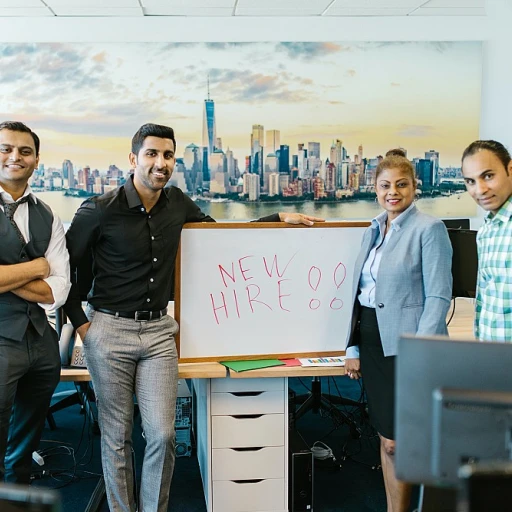The Changing Face of Leadership
The Transformation of Traditional Leadership Roles
As we navigate the complexities of the future workplace, the landscape of leadership is undergoing a significant metamorphosis. The once rigid command-and-control model is giving way to a more flexible and inclusive approach, driven by the fast-paced evolution of industries, technologies, and workforce expectations. Leaders are now expected to not only adapt to these changes but to also proactively shape their organizations in response.
Today's leaders must embrace a blend of empathy, collaboration, and innovation. The traditional top-down management style no longer fits the mold of success in a world where remote and hybrid work models are becoming the norm. This shift demands an agile mindset from leaders—a readiness to pivot and evolve in the face of new challenges and technologies.
Adapting to Technological Advancements
The rise of artificial intelligence, machine learning, and other cutting-edge technologies is reshaping how leaders operate. The integration of these tools within organizations has not only streamlined tasks but also redefined the skills necessary for effective leadership. Future leaders will need to harness data-driven insights to make informed decisions, ensuring their teams remain competitive and innovative.
Moreover, the emphasis on digital transformation has accelerated the need for leaders who are technically proficient and can inspire their teams to embrace these technologies. Equipping themselves with the knowledge to leverage these tools is crucial for leaders to foster a culture that thrives on technology-enhanced productivity.
Nurturing a More Inclusive Work Culture
As the global workforce becomes more diverse, inclusive leadership is becoming a cornerstone of successful organizations. The changing demographics of the workforce necessitate leaders who can champion diversity and cultivate an environment where every team member feels valued and heard. This inclusivity extends beyond just diverse hiring; it's about building a culture imbued with respect, cultural awareness, and open dialogue.
Empowering leaders to manage these complexities ensures that differences are celebrated and used as a source of strength. By fostering an environment that supports diversity and inclusion, leaders can unlock the full potential of their teams, driving growth and innovation.
For an in-depth look at how remote work is influencing these changes, read about the
emerging trends in work-from-home setups that leaders will need to accommodate in the future.
Essential Skills for Future Leaders
Embracing a Diverse Skill Set
In an era where the workplace is constantly evolving, future leaders must harness a wide range of skills to navigate the complexities that lie ahead. Traditional leadership qualities such as decisiveness and assertiveness remain valuable, but the modern workplace demands more nuanced abilities.
One such vital skill is emotional intelligence. As organizations become more diverse and inclusive, future leaders must possess the ability to empathize with their team members, understand their perspectives, and foster a sense of belonging. Developing this emotional literacy can lead to stronger team cohesion and enhanced performance.
Furthermore, the ability to manage and adapt to technological advancements is non-negotiable. Leaders who embrace digital literacy will not only drive innovation within their teams but also ensure their organizations remain competitive in a rapidly changing market. Familiarity with technology, from data analytics to artificial intelligence, equips leaders to make informed, strategic decisions.
Another crucial component of the future leader’s toolkit is cultural competence. With the rise of global teams, respecting and valuing cultural differences is more important than ever. Leaders who cultivate this awareness can create environments where diverse ideas flourish, leading to a more innovative and dynamic workplace.
Lastly, future leaders need to master the art of communication, ensuring that they can effectively convey their vision and inspire their teams, even across virtual platforms. This skill will also help them maintain transparent and open channels of communication, vital for both remote and on-site employees.
Understanding these essential proficiencies provides a foundation for leaders to prepare for the future workplace, enabling them to anticipate changes and efficiently lead their teams through the challenges of an ever-shifting landscape. As we look to the future, equipping today’s leaders with these skills is paramount to achieving long-term success. For a deeper dive into what the workplace might resemble in the coming years, consider exploring
what work looks like in the year 2030.
Building a Human-Centric Work Environment
Cultivating a Culture of Empathy and Inclusivity
In the ever-evolving landscape of the workplace, leaders are increasingly expected to create environments that prioritize human connection and inclusivity. This shift towards a human-centric approach is essential for fostering innovation, motivation, and overall well-being among team members. As we delve into this new era, it's crucial to explore how leaders can champion these values in their organizations effectively.
A key aspect of developing a human-centric work environment is promoting empathy. Leaders need to understand and acknowledge the diverse experiences and concerns of their employees. By practicing active listening and maintaining open lines of communication, leaders can build trust and respect within their teams. This not only enhances collaboration but also empowers employees to express their ideas and perspectives freely.
Inclusivity, on the other hand, involves more than just acknowledging diversity; it requires ensuring everyone feels valued and heard. Leaders should be proactive in creating policies and practices that cater to the varied needs of their workforce, removing barriers that may hinder participation or advancement. This includes recognizing the importance of flexibility at work, which can significantly enhance job satisfaction and productivity. For more insights on this topic, you can explore
embracing flexibility at work.
In building a work environment that champions these principles, emerging leaders must also leverage technology and continuously adapt their strategies. This adaptability enables organizations to respond effectively to the rapidly changing dynamics of the modern workforce while maintaining a focus on the human elements that drive success.
The Role of Leadership Development Programs
Empowering Leaders Through Continuous Development
As we navigate the ever-evolving landscape of the future workplace, the necessity of robust leadership development programs becomes ever more apparent. The traditional models of leadership are being redefined by rapid technological advancements and the increasing importance of interpersonal skills. Leaders today are expected to adapt quickly to change while fostering an environment of inclusivity and innovation.
Continuous development programs equip leaders with the tools they need to thrive in this dynamic environment. These programs go beyond mere skill acquisition and often include mentoring, coaching, and experiential learning. By immersing future leaders in real-world scenarios, organizations can cultivate leaders who are not only reactive but proactive, anticipating challenges before they arise.
Another critical aspect of these programs is their focus on emotional intelligence and resilience. As discussed in "Essential Skills for Future Leaders," mastering these components is key to not only handling the pressures of leadership but also in effectively managing remote and hybrid teams. This focus on soft skills helps leaders maintain a human-centric approach, ensuring they remain connected to the people they lead.
Moreover, leadership development programs are evolving to embrace digital tools, enabling a more personalized and flexible learning journey. Online modules, virtual simulations, and AI-driven feedback are just some of the innovations reshaping how leaders are prepared for the challenges of tomorrow. This digital transformation makes continuous upskilling more accessible and tailored to individual needs.
Investing in such programs offers a strategic advantage. It ensures a pipeline of leaders who are prepared to guide their teams through uncertainty, promote a culture of learning, and foster a progressive organizational ethos. As leadership continues to transform, those organizations that prioritize development will likely be the ones setting the pace in their respective industries.
Managing Remote and Hybrid Teams
Rising to the Challenges of Remote and Hybrid Leadership
As the world of work continues to evolve, one of the most significant shifts has been the rise of remote and hybrid teams. This presents unique challenges for leaders aiming to effectively manage such diverse configurations. Success hinges on the ability to adapt strategies and cultivate skills that foster productivity and collaboration across distances.
Communication is the lifeblood of any team, but it becomes even more crucial when dealing with remote and hybrid teams. Leaders must develop strong communication skills to ensure that everyone remains connected, informed, and engaged. Open lines of communication help bridge the physical gap, allowing team members to stay aligned with common goals and objectives.
Moreover, building trust within these teams is essential. Trust is the foundation of strong team dynamics, and leaders should advocate for transparency, setting clear expectations and delivering on promises. Encouraging occasional in-person meetings or team-building activities can strengthen relationships, solidify trust, and nurture a supportive work environment.
To lead effectively in this new landscape, flexibility is paramount. A one-size-fits-all approach no longer applies. Leaders must understand and respect the individual circumstances of team members, adopting flexible working models that accommodate diverse needs and promote work-life balance.
Adapting to these innovative models requires leaders to be proficient in digital tools that facilitate workflow and communication. Familiarity with project management software, video conferencing platforms, and collaborative tools can help streamline processes and enhance team efficiency.
In addition, performance assessment takes on a different dimension in remote settings. Leaders should focus on results rather than micromanaging employees. Providing regular feedback, empowering team members to take ownership of their tasks, and recognizing achievements are vital components of effective leadership.
As work continues to transform, those who rise to the challenges of managing remote and hybrid teams will find themselves at a distinct advantage. The ability to navigate and harness the potential of these modern work arrangements will define successful leadership in the future workplace.
Future Trends in Leadership
Navigating Tomorrow's Leadership Landscape
As we venture into the future workplace, understanding the evolving trends in leadership becomes crucial. Leaders must stay ahead of the curve to address challenges brought about by technological advancements, changing employee demands, and an increasingly globalized workforce.
Technical prowess will play a vital role in defining successful leaders of tomorrow. With the rapid integration of AI and machine learning into business processes, leaders must be tech-savvy to make informed decisions. This includes understanding how these technologies can improve productivity and ensuring their teams are equipped with the right tools to thrive.
Furthermore, leaders should focus on fostering diversity and inclusivity within their teams. According to numerous studies, diverse teams drive innovation and are better equipped to solve complex problems. As the world becomes more interconnected, leaders who prioritize building diverse teams will likely excel.
Another trend to watch is the emphasis on sustainable business practices. Leaders who champion environmental responsibility not only help the planet but also build trust and reputation with their customers and employees alike. Future leaders should consider how their organizations can minimize their ecological footprint while maximizing social impact.
Finally, agility will be an essential trait for future leaders. The ever-changing business landscape demands leaders who can pivot and adapt strategies swiftly in response to new challenges or opportunities. Leaders should strive to cultivate an agile mindset within themselves and their teams to navigate the uncertainties of tomorrow efficiently.
In conclusion, while the principles of good leadership remain constant, evolving societal expectations and technological advancements necessitate a proactive approach to leadership in the future workplace. Embracing these trends will prepare leaders to guide their teams successfully into the new era.












